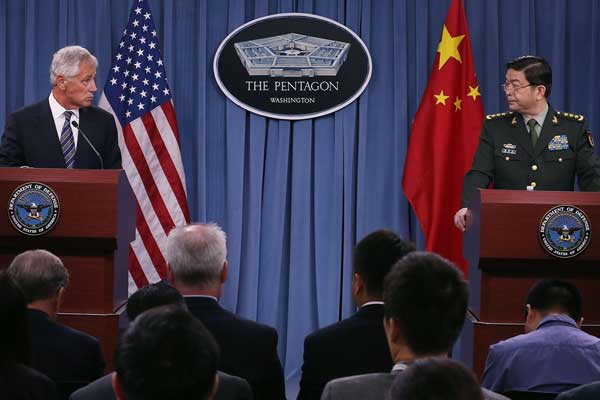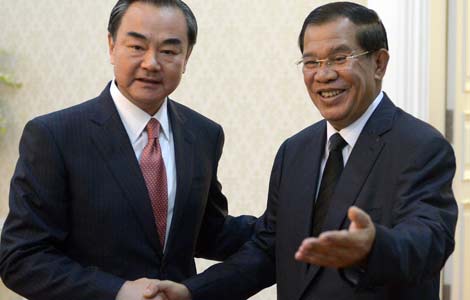Expanded Sino-US exchanges to stabilize ties
Updated: 2013-08-21 00:50
By Chen Weihua and Pu Zhendong (China Daily)
|
||||||||
China and the United States aim to build more stable military ties by agreeing to expand exchanges and exercises, despite distrust over cybersecurity and recent tensions over territorial issues in waters near China, observers said.
During their meeting at the Pentagon, visiting Chinese Defense Minister Chang Wanquan and US Defense Secretary Chuck Hagel spelled out plans for visits to China by senior US officers, counter-piracy drills in the Gulf of Aden and a humanitarian rescue exercise near Hawaii.
 |
|
US Defense Secretary Chuck Hagel and Chinese Minister of National Defense Chang Wanquan speak Monday at a news conference at the Pentagon in Arlington, Virginia. They spoke about regional issues and US-China relations. Mark Wilson/Getty Images/AFP |
Their talks represent efforts by Washington and Beijing to find constructive ways to deal with traditional concerns such as US arms sales to Taiwan, and new difficulties such as cybersecurity.
Chang is leading a military delegation on a four-day visit to the US. After three hours of "candid and in-depth" talks with Hagel on Monday, he said in a news conference that they had reached a five-point consensus to boost ties.
They said they would implement the "new type" of relations between major countries agreed on by Presidents Xi Jinping and Barack Obama during their meeting in June, Chang said.
Hagel hailed the visit by the Chinese delegation as "very productive".
"I think it's fundamental to the efforts that are underway ... to develop relationships, avenues of opportunity for transparency, for understanding each other's intentions far better than we have in the past," he said.
Experts said that despite China's attempts to overcome its past sense of rivalry with the US, Washington remains reluctant to redefine bilateral ties as a "new type of military relationship".
Zhao Xiaozhuo, deputy director of the Center on China-America Defense Relations at the PLA's Academy of Military Science, said Washington has doubts about readjusting military ties with Beijing because it might complicate relations with its allies.
"We don't see many substantive breakthroughs in the announced agreements."
"Chang's visit is still mainly discussing principles with the Pentagon," Zhao said.
Jonathan Pollack, director of the John L. Thornton China Center at the Brookings Institution, said clarifying how the two militaries view these possibilities should be a central task during Chang's visit.
"If the two defense leaders do not advance this process, the opportunity to curtail the possibilities of strategic rivalry will be lost. Without mutual restraint, a new type of major-power relations will not truly develop," Pollack said.
During their talk, Chang and Hagel agreed to set up a communication mechanism between the strategic and policy planning departments of the two militaries.
They will use existing means such as consultative talks and a maritime agreement, to explore a notification mechanism for major military activities and to continue to discuss rules for military air and maritime activities.
"I welcome this discussion and notice that the transparency we had is important to reducing the miscalculation and avoiding unintended tensions and conflicts," Hagel said.
Xu Qiyu, a researcher at the National Defense University of the PLA, said the notification mechanism would be a good start for pragmatic cooperation.
"Such a mechanism will strengthen mutual trust and reduce miscalculation, and most important, lead to better coordination with each other in regional military activities," Xu said.
During the news conference, Chang voiced concerns over the US policy of rebalancing to Asia.
"We hope the rebalancing strategy can bring peace to the Pacific region instead of seeking to weaken China," Chang said.
Experts said the US rebalancing strategy in the Asia-Pacific, part of its strategy to curtail China's rise, has emboldened some US allies, in particular Japan and the Philippines, to challenge China by breaking the status quo on some maritime territorial issues.
Kenneth Lieberthal, a senior fellow at the Brookings Institution, said that the rebalancing strategy is generating dynamics that increasingly threaten to undermine its primary goals.
"It is time to rebalance judiciously the rebalancing strategy," Lieberthal said, adding that the US-China relationship has gone in the wrong direction and distrust has grown since the pivot to Asia started about two years ago.
Despite difficulties building trust between the two countries, the Chinese military has agreed to participate in the Rim of the Pacific Exercise in 2014.

 Manning gets 35 years in WikiLeaks trial
Manning gets 35 years in WikiLeaks trial
 At least 37 killed in Malaysian bus crash
At least 37 killed in Malaysian bus crash
 FM calls for closer Cambodia relations
FM calls for closer Cambodia relations Problems for rural kids in cities
Problems for rural kids in cities
 Search for escaped crocodiles continues
Search for escaped crocodiles continues
 Police break up baby trafficking ring
Police break up baby trafficking ring
 Jeremy Lin celebrates birthday in basketball clinic
Jeremy Lin celebrates birthday in basketball clinic
 Police identify suspect in US school shooting
Police identify suspect in US school shooting
Most Viewed
Editor's Picks

|

|

|

|

|

|
Today's Top News
Bo Xilai stands trial for bribery, embezzlement
Manning gets 35 years in WikiLeaks trial
Chinese workers detained in Russia
US spying raises tensions with China
Wildlife plan struck with Kenya
Egypt court orders Mubarak's release
China to leapfrog US in oil imports
Flooding may get worse
US Weekly

|

|







